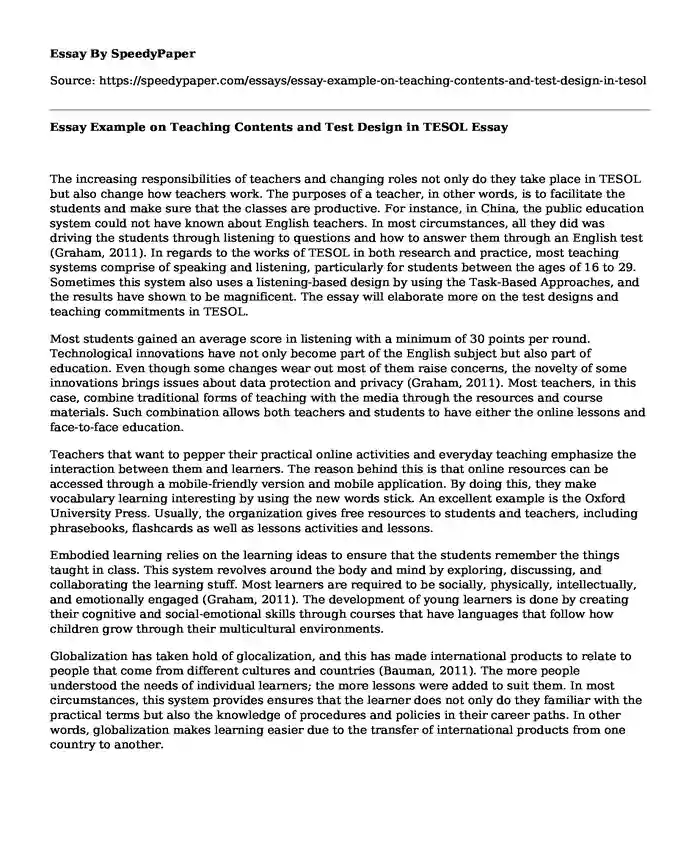The increasing responsibilities of teachers and changing roles not only do they take place in TESOL but also change how teachers work. The purposes of a teacher, in other words, is to facilitate the students and make sure that the classes are productive. For instance, in China, the public education system could not have known about English teachers. In most circumstances, all they did was driving the students through listening to questions and how to answer them through an English test (Graham, 2011). In regards to the works of TESOL in both research and practice, most teaching systems comprise of speaking and listening, particularly for students between the ages of 16 to 29. Sometimes this system also uses a listening-based design by using the Task-Based Approaches, and the results have shown to be magnificent. The essay will elaborate more on the test designs and teaching commitments in TESOL.
Most students gained an average score in listening with a minimum of 30 points per round. Technological innovations have not only become part of the English subject but also part of education. Even though some changes wear out most of them raise concerns, the novelty of some innovations brings issues about data protection and privacy (Graham, 2011). Most teachers, in this case, combine traditional forms of teaching with the media through the resources and course materials. Such combination allows both teachers and students to have either the online lessons and face-to-face education.
Teachers that want to pepper their practical online activities and everyday teaching emphasize the interaction between them and learners. The reason behind this is that online resources can be accessed through a mobile-friendly version and mobile application. By doing this, they make vocabulary learning interesting by using the new words stick. An excellent example is the Oxford University Press. Usually, the organization gives free resources to students and teachers, including phrasebooks, flashcards as well as lessons activities and lessons.
Embodied learning relies on the learning ideas to ensure that the students remember the things taught in class. This system revolves around the body and mind by exploring, discussing, and collaborating the learning stuff. Most learners are required to be socially, physically, intellectually, and emotionally engaged (Graham, 2011). The development of young learners is done by creating their cognitive and social-emotional skills through courses that have languages that follow how children grow through their multicultural environments.
Globalization has taken hold of glocalization, and this has made international products to relate to people that come from different cultures and countries (Bauman, 2011). The more people understood the needs of individual learners; the more lessons were added to suit them. In most circumstances, this system provides ensures that the learner does not only do they familiar with the practical terms but also the knowledge of procedures and policies in their career paths. In other words, globalization makes learning easier due to the transfer of international products from one country to another.
Conclusion
Tesol facilitates the students and makes sure that the classes are productive. In most cases, the increasing responsibilities of teachers and changing roles not only do they take place in TESOL but also change how teachers work. TESOL was designed in both research and practice; most teaching systems comprise of speaking and listening, particularly for students between the ages of 16 to 29. Embodied learning relies on learning ideas to ensure that the students remember what they have been taught.
References
Bauman, Z., (2011). On Glocalization: Or Globalization for some, Localization for some Others. Thesis Eleven, 54(1), 37-49. doi:10.1177/0725513698054000004
Graham, J. G., (2011). Bias-Free Teaching as a Topic in a Course for International Teaching Assistants. TESOL Quarterly, 26(3), 585-674. doi:10.2307/3587185
Cite this page
Essay Example on Teaching Contents and Test Design in TESOL. (2023, Jan 22). Retrieved from https://speedypaper.com/essays/essay-example-on-teaching-contents-and-test-design-in-tesol
Request Removal
If you are the original author of this essay and no longer wish to have it published on the SpeedyPaper website, please click below to request its removal:
Popular categories





